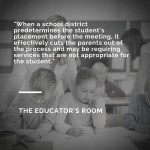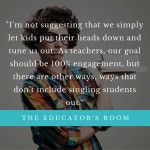Overview:
A teacher says we have to put aside our privilege and create authentic opportunities to engage with parents.
It is a privilege to sit back and criticize someone’s parenting. And yet, as teachers, paraprofessionals, social workers, and school leaders, we often do just that. Criticize.
Recently, there seems to be a reemergence of conversations on parenting in education. The blame game has been played for long enough and it’s time to stop. As educators, we must realize that our families are parenting as best as they can – with the hand they’ve been dealt.
As the parenting critiques persist, I am reminded of my own childhood experiences.
I’ve never seen your parents
“I have never seen your mom” is a criticism that nags my memory and pulls on my heartstrings. In elementary school, multiple teachers said this to me. What they were unaware of was that my mom was a supervisor who typically worked 14-16 hour days and was present for me as best she could be. She couldn’t show up for award ceremonies, volunteer for field trips, or watch my school performances. Her responsibility was rooted in providing a home for us to live in and putting food on the table. Because of her work schedules, in high school, I had to take two to three public buses and a train to get to my magnet program nearly eight miles from home.
I remember my mother spending many days parenting me from the phone to get me out of the house and to the bus stop so that I could make it to school on time. She was working three jobs at the time, so her presence and parenting were made through the phone calls each morning Each of us has been dealt a hand to play, and currently, families are playing the hands they’ve been dealt the best that they know how.
As educators, many of whom are also parents, we have a responsibility not to criticize how learners are parented but to share alternative parent and family engagement approaches and strategies that counterbalance the hands they have been dealt. As a classroom teacher, I’ve complained about a parent not doing x, y, or z – without considering the why of their choices or actions.
Instead of rushing to judgment and criticizing parents, we should consider the following strategies and support parents and families in ways that are meaningful and effective.
Increase Awareness and AddreFamilies’es’ Educational Needs
Provide differentiated educational sessions to inform families instead of blaming parents for what they don’t know or won’t do. Imagine facilitating ASL (American Sign Language) classes for families of learners who are Deaf/hard of Hearing in the classroom alongside their child, acknowledging that research states that 90- 95% of children who are Deaf/hard of Hearing are born to hearing families tdon’ton’t sign.
Rather than complaining and criticizing, I found solutions to suppfamilies’ies’ needs to communicate with their children; and increase language and literacy outcomes by providing in-person and virtual ASL sessions for famil es. In addition to creating monthly lessons in diverse formats, I collaborated with special education colleagues to provide opportunities for families to come into the classroom and follow their children through different less ns. This allowed families to see learning in action, be a part of the learning, and learn about the school community alongside other families.
Create Brave Spaces for parenting
Brave spaces are environments that foster open, honest, and supportive communication, understanding, and collaboration among educators, families, and students. These sp ces are characterized by empathy, respect, and a willingness to address the unique challenges and needs of learners with disabilities. Establis ing such spaces would empower parents and families to engage as respected and valued partners in their children’children’sn.
Disrupt Persisting Patterns of Gatekeeping and Stigmatizing Support
We must stop stigmatizing support requests. When fam lies need support we must not judge them. Support ooks different for every person. Because e judge parents for the type of support they need, many are hesitant or afraid to ask for the help that they and their children need. Not only is support being stigmatized, but it is also being withheld from families who would most benefit from it.
We have become gatekeepers of support, imposing parameters on who receives what type of support and who has access to certain supports. We must rovide diverse support options to our families and our students. A one-si e-fits-all approach will not work when it comes to the support offered to families.
The time has come for us to play a different hand with families. As educa ion partners, we have a responsibility, an obligation to speak up against gatekeeping and support for parents and families. We must dentify actionable solutions to increase parent support and family engagement. Now more than ever, we need to cultivate physical and digital learning communities that empower families/caregivers to provide and gain perspective to address their needs and the needs of learners in the education space. We must ake steps to normalize support and remember that families are playing their hand with the approaches they know and the experiences that they’ve hthey’vet wil you do to empower them to play that hand differently?






